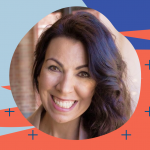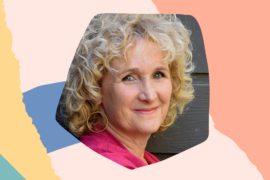Tama-Lea Lorenzen always wanted to be an entrepreneur, but struggling to make ends meet as a dance camp teacher and choreographer led her into the world of corporate training. When she didn’t fit in and started to lose her positivity, she decided to take control of her own destiny.
Now, at Engaging Gamification, Tama-Lea Lorenzen teaches entrepreneurs how to leverage gamification in their online courses and membership sites, which motivates students to engage with the content and implement what they’ve learned. And when people implement, it leads to unbelievable results.
Today, Tama-Lea takes us through her journey from entrepreneur to employee, and back again. She discusses the power of gamification in almost every market, and life-changing stories of the membership model.
KEY TAKEAWAYS
- Why Tama-Lea didn’t fit in with the corporate world – and the steps she took to quit her job and start her own business.
- How Tim Ferriss’ 4-Hour Work Week changed Tama-Lea’s life and led her to the membership model.
- Why engagement is absolutely crucial to making memberships work – and how gamification gets results.
- How Tama-Lea used Facebook’s marketing tools to stumble upon the winning combination that fuels her teachings.
Free Give
FREE Guide – Launch & Grow a Profitable Membership Site
Ready to reclaim your time and attract more monthly paying customers? Our step-by-step guide will show you how to build a membership site that turns your passion into recurring profit. Click here to download!
Memorable Quote
- “Life is short. If you do not try to take control over what your life is becoming, someone else will do that for you.” – Tama Leah Lorenzen
EPISODE RESOURCES
Transcript
Read The Transcript
[INTERVIEW] Shelli Varela: Tama-Lea Lorenzen, welcome to the It’s a TRIBE Thing Podcast. I am super happy you’re here. Tama-Lea Lorenzen: Thank you. I’m so excited to be here too, Shelli. It’s nice to talk to you. Shelli Varela: I loved our pre-conversation and the stories you were telling were amazing and resonated with me personally, obviously. So, just so people know, you teach gamification for entrepreneurs, as it pertains to online courses and membership sites. Tama-Lea Lorenzen: Yeah. Shelli Varela: And we’re going to get into like what is the actual value of that when you ripple effect that out? But I’m wondering if you can share with people where you were when you started like you weren’t always somebody who had this membership site. At some point, you were somebody who was discontent and maybe thought it wasn’t possible and were in a situation that was less than ideal for you as a human being. Can you take us back to that time and tell us how you got here? Tama-Lea Lorenzen: Do I have to go back to that time? No, I’m just… So, I’ve always been an entrepreneur in some form or fashion even if it’s just been inside my head sometimes, but like I was saying to you, Shelli, earlier is that I was the kid on the corner selling like a magazine I made out of like notebook paper and crayons. And then when I was in my 20s, I did choreography for competition dance teams and had a small company that did dance camps across the country with other instructors. And then just because of the kind of unpredictability of income from that business and the other businesses that I had tried, I worked mostly in corporate and I was mostly in the training department of whatever company I worked for. And I worked for some big names, IBM, Prudential, Starbucks, but honestly, never really fit in very well in that environment. You know, at first, I thought there was just something wrong with me like I wasn’t professional enough or I wasn’t maybe mature enough or old enough yet to fit in, in a corporate environment and I also wondered a lot like why are people so unhappy. Shelli Varela: I don’t mean to offend you with my happiness, people. Tama-Lea Lorenzen: Exactly. My positivity is being dampened down. I’m not sure. So, I just kind of came to the conclusion that, look, life is short. I cannot be in an environment where I don’t feel like I can be fully who I am like if I want to sing show tunes in my office and that’s what I’m going to do, and I don’t want people to look at me funny. Shelli Varela: I’m just getting the crowd. Sorry to just jump in quickly but one of the things you said to me that really resonated and I hear this a lot, you’re in this corporate training scenario and you’re delivering these speeches or presentations rather and the purpose is to educate and yet you’re looking out into the crowd and what’s looking back at you is these blank stares, these people who don’t want to be here, who are not interested in what you have to say. That and then also coupled with you were telling me like the fact that you’re in the training division but were offered no training on how to train is shocking. Tama-Lea Lorenzen: Yeah. It was shocking and it’s kind of like when you’re younger and you think certain things about the world like when I get my four-year degree and I go to work, then I will work hard, get recognized, and get more responsibilities and more pay. And then when you actually get into it, you realize it’s not exactly how it works out. I’m not saying it doesn’t work like that for everyone but it didn’t work like that for me. So, I worked for Starbucks and I was involved in their training and I love Starbucks. I have nothing bad to say about them but then they closed 600 stores, so I didn’t have any control over losing my job. And so, part of it was presenting material to people who maybe weren’t super excited about being there. They were being forced to be there, not having a lot of freedom and how I presented the information. And then also just the lack of control I had over my own destiny because even if I was doing an amazing job, maybe there was nowhere to go in that training department or maybe there were no opportunities to improve myself or maybe the downturn in the economy cost me my job and I had to figure out a different route. So, those were all kind of indicators that I needed to take more control over my own destiny. I know that sounds dramatic but that’s really how I feel about it. Life is short and if you do not try to take control over what your life is becoming, someone else will do that for you and it’s not going to turn out the way that you hoped. Shelli Varela: I love that you said that and I actually don’t think it’s dramatic. I think it’s very – no, honestly, and I just think like I heard this quote. I’m sure many of you have heard it as well. It’s like you either build your dream or someone else will hire you to build theirs. Tama-Lea Lorenzen: Yep. And that is so true and I never minded working for someone else until they were not as interested in my own self-development as I was. I always believe that if I’m a leader, it’s my role to develop the people that work with me and for me and that didn’t always seem to be the case I was in. And then to add another dramatic piece to this, my dad, he passed away when he was 26 years old actually right before I was born. And right when I was turning 30, I was kind of being a big baby about it and complaining about I’m going to be 30 and I’m going to be old. Okay, I’m 44 now so, obviously, I’m over that but then I realized at that point, I literally had lived four more years than my dad ever had. And so, it was absolutely like my honor, my responsibility. Shelli Varela: Oh, I just got goosebumps. Tama-Lea Lorenzen: Yeah, to make the most out of what I had because somebody like my dad or somebody that dies unexpectedly or just doesn’t have the opportunity to make the most of their life. I need to do that because I have the opportunity to. Shelli Varela: That is one of the most powerful things I’ve ever heard and here’s why. Money’s neat and freedom of your time and all of that stuff is neat, but if you don’t have your time like so many people don’t have time and we all think we have so much of it. I’m always reminded about this one quote and I’ve used it in a few talks and it’s like on the day you draw your last breath, the person you are gets to meet the person you could have become. And our job in that blink of time is to close the gap. And so, first of all, I honor you for knowing that, for doing that, and following your heart because that is a thing that is scary for a lot of people. But here’s the thing, like what if you try and you fail? But what if you try and it’s amazing? So, tell us what happened in your story then. Tama-Lea Lorenzen: Yeah. So, I basically decided I probably say about six or seven years ago, I read a book, I’m sure everyone’s familiar with it. It’s called the 4-Hour Workweek by Tim Ferriss. And that was really what introduced me to the whole like digital entrepreneur where I didn’t have to sell a product or exchange my hours, for example, teaching dance camps or in a coffee shop, the building, paying for rent and all of that stuff, but that I could have a business that was based on teaching something once, in my case, and having it affect many, many people and then, of course, being paid for that effect on many, many people. So, again, that idea of not exchanging my hours for dollars but exchanging my hours for multiple dollars and multiple impacts on people. So, I read that book and then I happened to be on vacation on a beach so it was just like the perfect setting for like talking about freedom and how to build the life that you want. My husband read it and that was kind of like, “Oh boy, now we’re both thinking along the same lines.” And so, I started experimenting and could I do this? Could I do that? And after some experimenting, I finally landed on the idea that I don’t want to sell products online. I don’t want to worry about inventory or about creating the next cool t-shirt design or anything along those lines. I wanted to use my skill of being an amazing trainer, which took a while to get to but it’s one of my superpowers and be able to create packages that then would be offered to whoever could benefit from them. So, it has taken some time to get to the place where I knew that I wanted to offer courses and memberships but once that clicked, and once I found this TRIBE group and Stu, it all made so much more sense. So, now I have a course, I have a membership, and I am also an adjunct instructor, which means like a part-time professor without the Ph.D. And so, I have so much more flexibility in my life and I get to do more of the things that I absolutely enjoy doing which I couldn’t ask for more. I really couldn’t. Shelli Varela: Well, let’s talk a little bit about that because I have also been in training scenarios with the people who are attending not wanting to be there. And I know what those blank stares, those searing blank stares feel like. So, what you’ve created is gamification, which is in terms of helping people make courses and membership sites that people actually consume. What you’re doing is kind of like the anti-blank stare like… Tama-Lea Lorenzen: Yes. Shelli Varela: How can we get you guys engaged? Onboard? You know, like tell us about how gamification works and how you help people get those results and how it pertains to you as a membership site owner. Tama-Lea Lorenzen: You bet. So, if you don’t mind, real quick before I tell you about that, I will tell you that the tipping point for me, so normally I taught professionals, working adults, and even in my adjunct instructing job I taught non-traditional students and then I had two semesters worth of traditional students, and no offense to 20-year-olds, but they are literally half my age and talk about blank stares. That was painful, so much so that I really had to figure out how do I make this not painful for me and not painful for them twice a week for two-and-a-half hours. So, this is where the kind of pulling together of all the things I knew really came to a head and became this idea of engaging gamification. So, gamification is a term that we’ve all heard here or there, right? If you have a Starbucks rewards card or you’ve ever signed up for airline miles, you have used gamification, but engaging gamification for me is the process I’ve put together to talk specifically about what do you do in order to get people engaged in your online courses and memberships? Because if they aren’t engaged in your online courses and memberships, you won’t have a successful business. And you touched on it, Shelli. So, if people do not engage with you, whether it’s your course, your membership, they’re not going to then consume your content, your training, what you’re trying to teach to them. They are then not going to implement that because they aren’t paying attention. They aren’t listening to it. They aren’t consuming it. And if they don’t implement what you’re teaching, they’re not going to get results. If they don’t get results, you don’t have amazing stories to tell other people about the impact you’ve made with your course or your membership. So, worst-case scenario, people don’t go through your course. Maybe they buy and they never delve into it. Worst case is that they tell everybody else, “Well, I couldn’t get through that course because it was so boring,” that you don’t want people to say that about your course or membership. Shelli Varela: Either of those two things, they didn’t go through it or they didn’t like it. Tama-Lea Lorenzen: Yes. Because if they don’t get through it, yes, they already gave you the money but it’s beyond that, right? If you don’t continue to get them results, it’s like any other business. If you were to go to the chiropractor or you were to go to the gym and your personal trainer is working with you or your chiropractor is working with you and yet you don’t feel better, you don’t look better, you’re going to stop going to that person. So, it’s the same idea. You know, at the very least they’ve given you money and if they don’t go through your course or membership, they get nothing out of it and we can’t feel good about that. We can’t feel good about not having people engage. Shelli Varela: Right. And it’s also not sustainable. Tama-Lea Lorenzen: Yes, exactly. So, Stu talks about that circle of awesomeness. Shelli Varela: Yes. Tama-Lea Lorenzen: So, not having engagement means you do not have the circle of awesomeness. And so, what I call the opposite of that, the cycle of doom, which is dramatic in my style here. Shelli Varela: So, how did that work for you in terms of transitioning? So, you realize you had this culmination of assets, you had training prowess, you had a light and an energy and the ability to put the key in the lock and kind of turn it and turn those learners on and engage them. So, how has that transitioned now for you as a membership site owner in terms of your ability to impact your students regularly because now you’re tapping in and creating a relationship with them and then the results and the ripple effect that that creates for them and for you? Tama-Lea Lorenzen: Well, it’s really amazing the kind of I’m going to just call it power or energy that comes from finding people that are as excited about the thing you’re teaching, as you are. So, when I got my first few members, I asked them to all do a Facebook live in the group to introduce themselves. So, don’t just type me about yourself like put your face on Facebook. Let me hear you talk. Let me see your face. And the impact of that on me was so huge because these people were geeking out just as much about gamification as I was, and I was thinking before that moment that they were finding me, but like I found them and so the power and the energy just kind of multiplies from there. So, being able to, first of all, have that connection was really powerful because like I said, they were as excited about it as I was and that makes all the difference. But now being able to deliver what I call like these packages, so this package of knowledge every month that they can then implement. So, it’s not just about learning. It’s about implementing it and then every month for them to see the results is so exciting. It’s so exciting because it’s impacting me because I have a business. It’s impacting them because it’s increasing engagement in their business. And then for me, my like ripple effect is that I hope to be able to retire my husband. As I mentioned earlier, he’s a police officer but his dream, and he enjoys his job, but his dream is to be a pro-triathlete and he’s been working really hard at that for several years, but he really needs to be able to train full time in order to get to that status. So, my ripple effect is if I’m able to retire him and he can focus on his dream, think about the power and energy that comes with that and how he can then affect other people because then he wants to coach, he wants to have a membership. And then for all the people that are members of my membership is starting to get very meta, but with increased engagement from gamification, they have a bigger business, they have more impact on other people, and it’s amazing and just crazy to think about like the ripple effect that comes from that. Shelli Varela: Absolutely. And I want to trace that back for everybody listening because you were somebody who had a secure job, who felt a little bit of friction or resistance around it, and at some point, you were a person who didn’t have a crystal ball, couldn’t see the future, but you knew what you knew and it sounded something like, “Hey, I have an idea,” and all amazing things that you see in the end started at some point with somebody looking at the culmination of their assets, “I’m a trainer. You know, I like to help people. I’m hyper attuned to the fact that some people are disengaged, I know how to make them engaged,” and really just going through your laundry list of things that you have and skills and gifts, and finally saying, “Hey, I have an idea.” Tama-Lea Lorenzen: And, Shelli, I have to be really honest with you like it took me a bit to get to that specific combination because I think we all have like these circles of interest and expertise. I think we’re all lucky in the world we live in right now that we don’t have to be a specialist in one thing, we can have many interests and many things that we’re really good at, many expertises. I’m not sure if that’s a word. Shelli Varela: Expertise. Tama-Lea Lorenzen: Yeah, sure. There we go. So, I think of them as circles and Venn diagram. When you put those three circles together, at some point they intersect. Well, I had like six or seven like I think everyone listening has six or seven of those circles. And so, it’s just about sometimes trying different circles together and where they intersect is what you need to try to go after. And so, my example is I teach marketing, I teach selling, so that was another area that I thought, “Well, maybe I could use gamification in marketing and teach that.” So, I actually did a Facebook ad and tested people’s responses to the idea of adding gamification to their marketing and on the other side of that, testing what people thought about adding gamification to their online course and their content. And the response to the content gamification was so much greater and so much more excited that I was like, “Okay. Well, they’re telling me that’s what they want,” so that’s the circle, all those three Venn diagram circles came together and that’s how I knew to continue to go that direction. So, we all have so many different things we’re good at that if you just keep trying to put them together in the right order, you’ll get there. You will say, “Oh, my gosh, I have this idea,” and maybe that last idea didn’t work as well as I thought it would, but you’re going to get that idea that is golden. Shelli Varela: Yeah. Well, I just want to honor you for starting, because in the beginning, like everybody is looking to get it perfect before they get it going. And honestly, you can’t steer a parked car, like you can’t pre-plan for everything that could possibly happen. But once you start moving, the world gives you feedback. Tama-Lea Lorenzen: Yeah, absolutely. I can tell you that I have overcome that fear of knowing exactly the way things should be. When the couple times I didn’t spend hours and hours preparing to teach were the best classes I ever taught because I just relaxed a little bit, tried some stuff, and guess what, those things that took with just a little bit of a jump or a leap of faith worked. And that has been the thing that has been super powerful for me is anytime I’m not sure exactly how something’s going to go, how it’s going to work out, I just keep moving forward and 99% of the time it works out to be one of the best things I ever did. Shelli Varela: Agreed. I could talk to you for hours. Tama-Lea Lorenzen: Okay, but I’m hungry. Shelli Varela: There. I see you in a CrossFit shirt so I know what that means. I know that there are going to be many people out there that would like to know more about you, perhaps be part of your membership community. If people are looking for you online, where’s the best place to find you? Tama-Lea Lorenzen: Yeah. You can find me at EngagingGamification.com or search Facebook for my group, which is Engaging Gamification. Shelli Varela: Amazing. Thank you for your awesome example. I appreciate you. Tama-Lea Lorenzen: Thank you, Shelli. [END]
To learn more and get access to all episodes, visit our podcast page!






